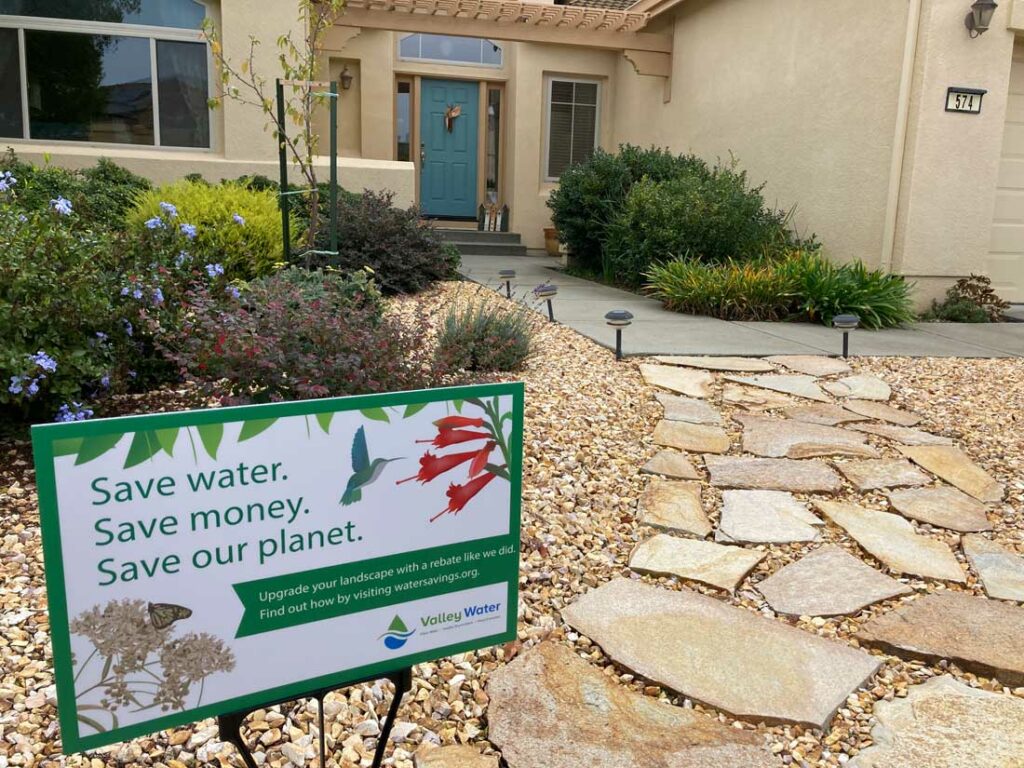
Homeowners and commercial property owners who want to cut down on their outdoor water use and landscape maintenance should consider starting now or in the spring if they want to install drought-tolerant lawns, according to conservation experts.
Regardless of what time of year one is able to complete such a project, interested property owners can gain rebates from Valley Water—up to $3,000 for residential and $50,000 for commercial properties—to offset the cost of their new landscaping installation.
Morgan Hill residents Bob and Nancy Wells showed off their drought-tolerant lawn on Calle Sienna at a Nov. 16 event organized by Valley Water, the water district that serves Santa Clara County. Since the Wells installed their low-maintenance yard about three years ago, they have found it much easier to pull weeds and keep the landscape from becoming unruly. They have also seen local fauna such as hummingbirds and butterflies return to their home.
Bob Wells explained how he dug up the home’s previous lawn, which was just “non-functional” grass, after gaining inspiration from a neighbor who had completed a similar lawn conversion. Wells replaced the grass with a layer of sand, weed cloth and gravel ground covering on top.
He and Nancy also installed a number of native and drought-resistant plants that are on Valley Water’s list of rebate-qualified species: yarrow, plumbago, ceanothus (California lilacs), lantanas and Chinese fringe flowers.
“It’s more visually beautiful, and we’re able to cut flowers and take them inside,” Bob Wells said. “The yarrow dries really nicely.”
Another big advantage: the couple’s water bill went down from about $110 to $95 per month. Helping in this endeavor is the installation of a solar synchronizing irrigation controller, which Wells said Valley Water offered another rebate for. “That saves water at all stations, for everything,” Bob Wells said.
Rebates for drought-tolerant lawns and water-saving appliances are among numerous incentive programs offered by Valley Water to encourage residents and business owners to limit their water use. Not only is the fall one of the best seasons to undertake a new landscape installation—the county is in the midst of a major statewide drought that has reduced water supplies and could continue well into next year, or longer.
“These programs are very attractive to homeowners as well as commercial” property owners, Valley Water Director John Varela said at the Nov. 16 event at the Wells home. “Over 50% of your daily water use, as a homeowner, is in irrigation. That’s a huge amount of water, so the board of directors has created the rebate program, which is extremely popular.”
Valley Water Conservation Specialist Ashley Shannon said in July, the district increased drought-tolerant lawn rebates from $1 to $2 per square foot, up to $3,000 per home. The City of Morgan Hill has agreed to supplement the Valley Water program by offering an additional $1 per square foot of converted lawn.
Participation in the program has grown exponentially, and the water savings can be immense. Shannon said it is estimated that by converting from a grass lawn to drought-tolerant, property owners can save about 35 gallons of water per square foot per year.
Since July, Valley Water has seen about a 250% increase in the number of property owners seeking drought-tolerant lawn rebates.
Shannon explained that property owners should consult with district staff and submit their plans before converting lawns to ensure they meet Valley Water’s criteria for a rebate. The district’s website for the programs includes a list of drought-tolerant plants that owners can install to qualify for a rebate.
She added that permeable ground coverings like gravel or wood chip mulch are preferred, as these allow irrigation and storm water to percolate back into the groundwater. Low-flow irrigation systems are among the criteria for a rebate.
Valley Water has a list of qualified landscape contractors, but homeowners can do the work themselves or hire any contractor they want as long as their plans meet the installation requirements, Shannon said.
Shannon listed further advantages of converting to a drought-tolerant lawn: “You can cut down on weekly maintenance—it’s more seasonal (instead of year-round) with yards like this. It reduces weeds, chemicals you have to use and gas-powered mowers.”
Bob Wells said it was easy to work with Valley Water when he decided to use a rebate to install his drought-tolerant yard. He contacted the water district, which sent staff to his home to take measurements and photographs.
Wells did the work himself, and sent additional photos to Valley Water throughout the installation process. He said he used Microsoft Word to tweak a different set of landscape plans he acquired from his neighbor.
“I enjoyed the creative experience. It was quite fun to generate plans,” said Wells, who is a retired IBM engineer.
The water district also offers rebates and incentives for other water-saving features, including graywater reuse, rainwater capture and irrigation equipment upgrades. For more information, visit valleywater.org/watersavingsorg.
While Valley Water officials are encouraged by the growing popularity of the district’s rebate programs, Varela said he would like to see more participation from the valley’s biggest water guzzlers.
“My message to businesses and managers of the community is, we need to talk more about conservation. And you need to play your part as well as the homeowners are, and qualify for the rebate,” Varela said.








